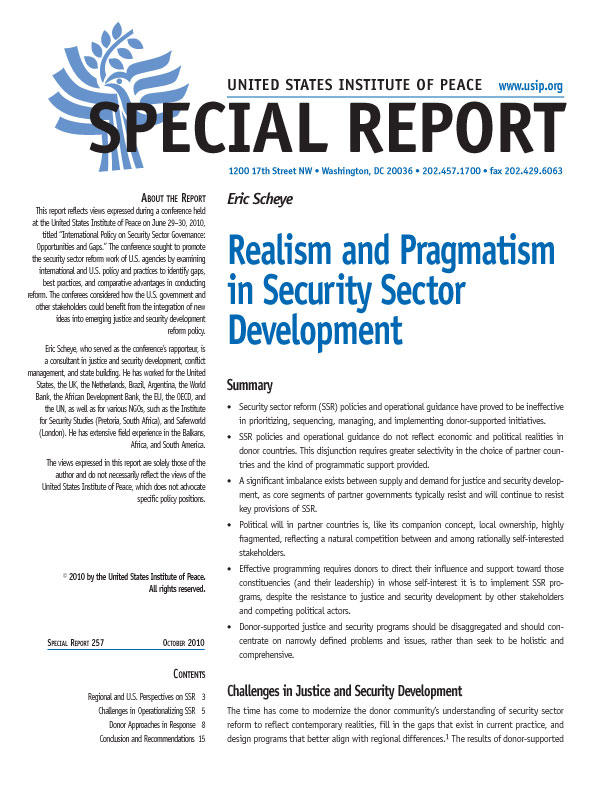This report reflects views expressed during a conference held at the United States Institute of Peace on June 29–30, 2010, titled “International Policy on Security Sector Governance: Opportunities and Gaps.” The conference sought to promote the security sector reform work of U.S. agencies by examining international and U.S. policy and practices to identify gaps, best practices, and comparative advantages in conducting reform.

Summary
- Security sector reform (SSR) policies and operational guidance have proved to be ineffective in prioritizing, sequencing, managing, and implementing donor-supported initiatives.
- SSR policies and operational guidance do not reflect economic and political realities in donor countries. This disjunction requires greater selectivity in the choice of partner countries and the kind of programmatic support provided.
- A significant imbalance exists between supply and demand for justice and security development, as core segments of partner governments typically resist and will continue to resist key provisions of SSR.
- Political will in partner countries is, like its companion concept, local ownership, highly fragmented, reflecting a natural competition between and among rationally self-interested stakeholders.
- Effective programming requires donors to direct their influence and support toward those constituencies (and their leadership) in whose self-interest it is to implement SSR programs, despite the resistance to justice and security development by other stakeholders and competing political actors.
- Donor-supported justice and security programs should be disaggregated and should concentrate on narrowly defined problems and issues, rather than seek to be holistic and comprehensive.
About the Report
This report reflects views expressed during a conference held at the United States Institute of Peace on June 29–30, 2010, titled “International Policy on Security Sector Governance: Opportunities and Gaps.” The conference sought to promote the security sector reform work of U.S. agencies by examining international and U.S. policy and practices to identify gaps, best practices, and comparative advantages in conducting reform. The conferees considered how the U.S. government and other stakeholders could benefit from the integration of new ideas into emerging justice and security development reform policy.
Eric Scheye, who served as the conference’s rapporteur, is a consultant in justice and security development, conflict management, and state building. He has worked for the United States, the UK, the Netherlands, Brazil, Argentina, the World Bank, the African Development Bank, the EU, the OECD, and the UN, as well as for various NGOs, such as the Institute for Security Studies (Pretoria, South Africa), and Saferworld (London). He has extensive field experience in the Balkans, Africa, and South America.
The views expressed in this report are solely those of the author and do not necessarily reflect the views of the United States Institute of Peace, which does not advocate specific policy positions.